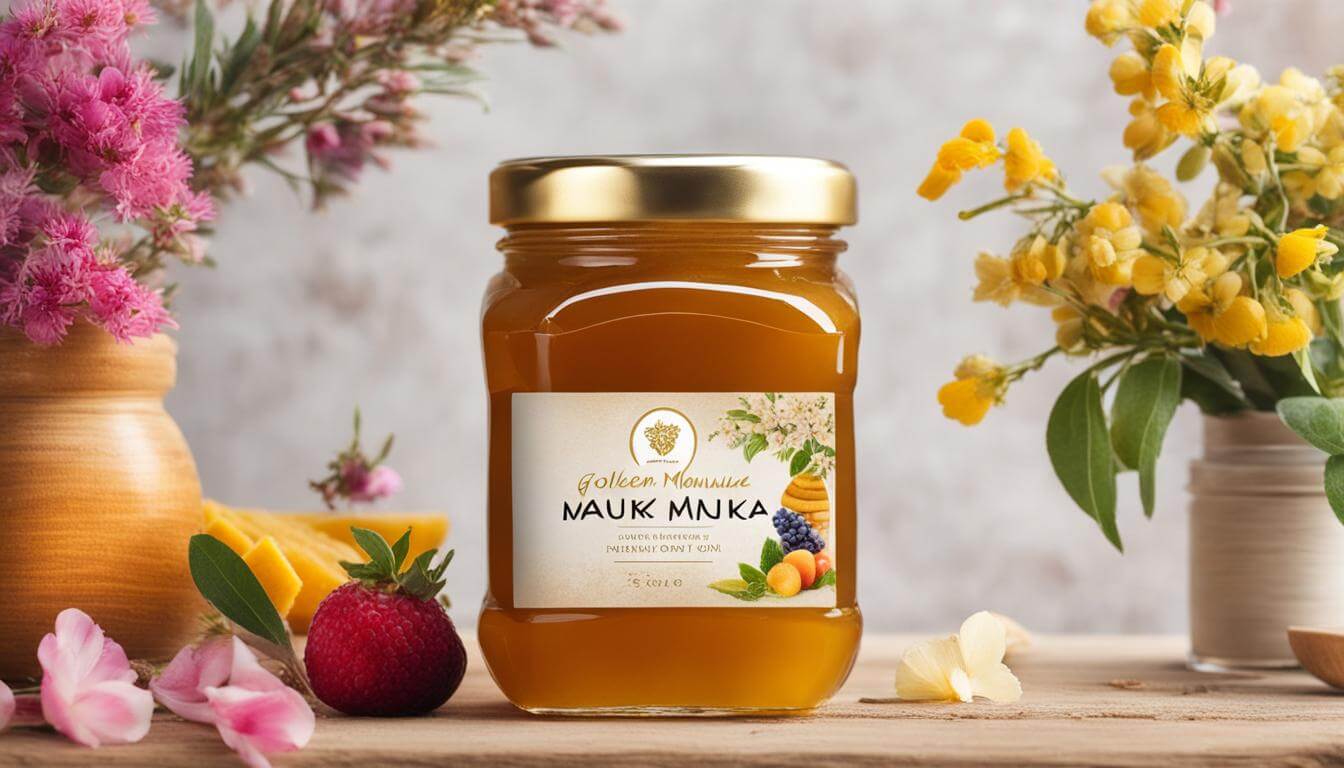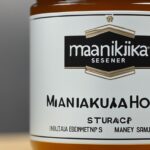In a world where nearly 80% of antibiotic prescriptions may be unnecessary, a natural remedy rises in the ranks of health care. Enter Manuka honey—a potent product from New Zealand, threading the line between deliciousness and therapeutic might. With science to back its whispers of wellness, the manuka honey uses stretch far beyond a mere spread on toast. Its health benefits of manuka honey have earned it the status of a natural superfood, with proponents hailing its proficiency in healing and holistic care. In a harmony of sweetness and science, this beehive bounty encapsulates the essence of manuka honey wellness.
Known among indigenous cultures for centuries, this honey isn’t just a pantry staple—it’s a medicine cabinet must-have. As research buzzes with promise, let us explore the honeyed horizon where wellness weaves wonder into every drop.
Unlocking the Power of Manuka Honey: Antimicrobial Properties and Health Potentials
Manuka honey is renowned not merely as a delectable spread but also for its intriguing health potential of manuka honey. The heart of its distinction lies in the unique antimicrobial properties that set it apart from conventional honey varieties. It is the rich presence of methylglyoxal (MGO), derived from the nectar of the Leptospermum scoparium plant, that imbues it with potent antibacterial capabilities.
Research highlights that MGO is directly correlated with the efficacy of manuka honey in destroying bacteria on contact. This makes it not just a sweet indulgence but a powerful ally for health and wellness. Beyond just its antibacterial features, the honey’s blend of antiviral, anti-inflammatory, and antioxidant qualities assemble a superior natural remedy, capable of supporting wound healing and possibly accelerating tissue regeneration.
In the realm of natural antimicrobial agents, manuka honey shines as an extraordinary example, one that could redefine the approach to treating a range of conditions. Its extensive applications extend from enhancing personal well-being to proposing a shift in the landscape of natural health treatments.
Optimizing Wound Care with Manuka Honey: A Natural Healer
Manuka honey has been capturing attention as a potent natural wound healer, with a particular efficacy for treating difficult conditions such as manuka honey for burns, diabetic ulcer treatment, and antibiotic-resistant infections. In this section, we delve into the transformative properties of Manuka honey and how its application is revolutionizing the field of wound care.
| Wound Type | Treatment with Manuka Honey | Typical Healing Outcomes |
|---|---|---|
| Burns | Topical Manuka honey applications | Accelerated healing, reduced scarring |
| Diabetic Ulcers | Manuka honey dressings | Decreased ulcer size and improved tissue regeneration |
| Antibiotic-Resistant Infections | Direct application of medical-grade Manuka honey | Effective against strains like MRSA, reduced infection rates |
As evidenced by the table, Manuka honey is not merely an ancient remedy but a contemporary solution for complex medical challenges. While traditional antibiotics struggle against resistant strains, Manuka honey presents a natural, effective option without the side effects of pharmaceuticals. Its multi-action properties not only deter bacterial growth but also foster an optimal healing environment.
Moreover, the benefits of Manuka honey extend beyond its potent antibacterial properties. Its hygroscopic nature helps to maintain a moist wound environment, which is essential for healing. The honey also creates a protective barrier, preventing further contamination.
Patient outcomes have shown remarkable improvements when using Manuka honey, particularly for those who are grappling with diabetes or have sustained severe burns. It is a testament to the potential of natural remedies in modern medicine, reaffirming the position of Manuka honey as a vital resource in wound management protocols.
Manuka Honey How to Use for Oral Health and Hygiene
Exploring the intersection of nature and dental care, Manuka honey emerges as a powerful ally for oral health. Its efficacy in promoting dental hygiene is backed by science, with studies supporting its role as a natural remedy for gingivitis and its ability to prevent tooth decay. The unique properties of Manuka honey can inhibit oral pathogens responsible for dental issues, making it a sweet but formidable defender of oral wellness.
The secret behind Manuka honey’s oral health benefits lies in its rich antibacterial properties. Unlike refined sugars which are detrimental to dental health, Manuka honey offers sweet benefits without compromising your pearly whites. Here’s a closer look at how this natural wonder can be integrated into your daily oral hygiene regimen:
| Manuka Honey Oral Health Benefit | Action |
|---|---|
| Plaque Prevention | Its antibacterial activity targets the buildup of plaque, keeping teeth clean and free of harmful bacteria. |
| Gum Inflammation Reduction | Reduces swelling and redness associated with gingivitis and periodontal diseases. |
| Protection Against Tooth Decay | Helps to shield teeth from decay by fighting decay-causing bacteria. |
| Natural Sweetener | Sweetens without the negative effects of sugar, preventing the common sugar-related tooth decay. |
Incorporating Manuka honey into your oral care routine can not only enhance the health of your mouth but also offer a pleasurable experience with its rich taste and texture. Elevating the act of dental maintenance from routine to a moment of natural indulgence is a step towards holistic wellbeing, with Manuka honey as your tooth-friendly companion.
Manuka Honey in Cough and Throat Relief: A Natural Soother
Manuka honey has long been embraced for its therapeutic properties, often finding a place in the homes of those seeking natural cough relief and sore throat remedies. Known not just for its sweetness but also for its potent bioactive compounds, Manuka honey is a key natural player in managing symptoms associated with upper respiratory infection treatment. Its effectiveness lies in its soothing texture and anti-inflammatory properties, which coat the throat and reduce irritation.
Seasonal changes and colds often lead to the uncomfortable tickle in the throat, but with Manuka honey, relief is not just sweet but also scientifically supported. This honey stands out for its ability to fight pathogens and alleviate inflammation, providing a dual-action solution. Moreover, while antibiotics can target bacteria, they are not effective against viral URTIs and can contribute to resistance. Manuka honey offers a gentler, yet efficient, alternative.
Beyond anecdotal evidence, research supports the use of this natural elixir, revealing how it can undercut the persistence of coughs and interrupt the cycle of throat irritation. As we delve into the components that make Manuka honey a superior choice for respiratory woes, one can’t help but be impressed by its multifaceted role in health and wellness.
| Symptom | Manuka Honey Benefit | Traditional Remedy |
|---|---|---|
| Cough Frequency | Reduces occurrence | Temporarily soothes |
| Cough Severity | Decreases intensity | Varies by medication |
| Sore Throat | Antibacterial and soothing properties relieve pain | Often requires medication or lozenges |
| Inflammation | Anti-inflammatory agents reduce swelling | Usually treated with anti-inflammatory drugs |
| Upper Respiratory Infections | Supports immunity and combats infections | Antibiotics prescribed, not effective against viruses |
Turn to Manuka honey as your go-to natural cough relief, not only for its sweet comfort but as a proactive measure against the harshness of coughs and sore throats. It’s nature’s own remedy, offering a harmonious blend of taste and healing, packed within every drop of its golden hue.

Natural Gastric Ulcer Prevention: Manuka Honey’s Gastrointestinal Benefits
The search for effective ways to treat gastric ulcers and manage H. pylori infections has led many toward natural remedies, with an increasing spotlight on Manuka honey’s role in gastrointestinal health. Renowned for its robust antibacterial properties, Manuka honey is revered not only as a sweet, delectable substance but also as a formidable opponent against the H. pylori bacteria associated with peptic ulcer disease.
A myriad of studies reveal that those who include Manuka honey in their diets may experience a decline in H. pylori prevalence, thus positioning this natural product as a potent natural ulcer remedy. The honey’s unique components are believed to inhibit the growth and diminish the activity of H. pylori, the notorious bacterium that resides in the stomach’s mucosal lining and which, if unchecked, paves the way for peptic ulcers and potentially even gastric cancer.
Beyond its antibacterial credentials, Manuka honey also shows promise in protecting the stomach lining from alcohol-induced erosions, suggesting its preventive capabilities extend to a range of gastric insults. This honey’s soothing effect contributes to a protective coat within the digestive tract, assisting in healing and providing relief from the discomfort often associated with digestive ailments.
Embracing Manuka honey as part of a daily wellness routine could, therefore, offer dual benefits: the joy of a natural sweetener and potentially substantial defensive measures against gastric ailments that afflict millions worldwide. As an adjunct to a balanced diet, Manuka honey might just be the golden ticket to maintaining a healthier stomach and enjoying the sweet life without the sting of gastric discomfort.
Manuka Honey’s Digestive Advantages: Alleviating IBD Symptoms
In the quest for maintaining optimal digestive health, Manuka honey emerges as a promising natural option. Characterized by its unique natural antibacterial properties, it has piqued the interest of health enthusiasts and researchers alike. The potential of Manuka honey for providing IBD symptom relief cannot be understated, as it targets and helps control the effects of C. diff – a challenging bacterium associated with adverse digestive conditions.
Among those who experience the discomfort and complications of Inflammatory Bowel Disease (IBD), Manuka honey’s therapeutic characteristics offer a glimmer of hope. Its multifaceted components work synergistically to potentially reduce inflammation and restore balance within the gut biome. This is not only an advancement for those seeking relief but also represents a broader movement towards embracing nutrient-dense natural substances for health improvement.
Continued exploration into the positive effects of Manuka honey on digestive functionality affirms its role as a supportive dietary addition. It’s not just about alleviating symptoms; it’s about contributing to a foundation of well-being that can preemptively address digestive disturbances. While it is no replacement for professional medical treatment, Manuka honey’s role in a holistic approach to digestive health remains a topic worthy of further discussion and research.
Enhancing Respiratory Health: Manuka Honey’s Effect on Cystic Fibrosis
Exploring the vast potential of natural remedies, Manuka honey has emerged as a beacon of hope in cystic fibrosis treatment. Renowned for its antibacterial effects, this exceptional nectar challenges the status quo of medical interventions by offering supportive therapy aimed at bolstering respiratory health. Its combative action against pathogenic bacteria such as Pseudomonas aeruginosa and Burkholderia cepacia positions it as a potent ally in managing the recurrent respiratory infections that cystic fibrosis patients typically endure.
Research suggests that when used alongside standard treatment protocols, Manuka honey may improve the overall therapeutic outcomes. Its ability to act in conjunction with antibiotics enhances their effectiveness, thereby potentially mitigating the onset of antibiotic resistance—a critical concern in cystic fibrosis care. Here’s a closer look at how Manuka honey’s properties can impact the health of those living with this chronic lung condition:
| Therapeutic Aspect | Details | Impact on Cystic Fibrosis |
|---|---|---|
| Antibacterial Activity | Manuka honey combats harmful bacteria that can exacerbate lung infections. | Reduction in infection rates and improved lung function. |
| Antibiotic Enhancement | Boosts the efficacy of antibiotics, helping to clear bacterial colonies more effectively. | Higher success rates in managing infections, with potential lowering of antibiotic resistance. |
| Anti-inflammatory Properties | Helps soothe inflamed respiratory tissues. | Alleviation of symptoms like coughing and breathlessness, enhancing quality of life. |
| Biofilm Disruption | Manuka honey can disrupt the biofilms produced by bacteria, which are common in cystic fibrosis. | Assists in clearing mucus, allowing better breathing and lessening bacterial defenses. |
As the medical community continues to seek novel therapies, incorporating Manuka honey into the regimen of cystic fibrosis patients offers a complementary approach to their existing treatment plans. Although further research is required to fully validate these findings, the initial evidence points towards a positive influence on the management of this complex condition.
Manuka Honey for Clear Skin: An Acne Remedy?
Exploring the realm of natural acne treatment, skincare with manuka honey emerges as a beacon of hope for those who suffer from the blemishes and discomfort of acne. Manuka honey, known for its potent anti-inflammatory benefits, offers a promising alternative to conventional chemical remedies. This sweet nectar possesses antibacterial properties that could be the key to unlocking clearer, healthier skin without the side effects typically associated with traditional acne medications.

While scientific research is still evolving, the anecdotal testimonies of countless individuals reveal that incorporating this natural elixir into their skincare routine has made tangible differences. Manuka honey’s healing properties, attributed to its high MGO content, act on skin bacteria, quelling the inflammation and irritation that often accompanies acne.
| Benefits of Manuka Honey | Common Acne Treatments |
|---|---|
| Antibacterial action | Chemical antibacterials (e.g., benzoyl peroxide) |
| Natural anti-inflammatory | Synthetic anti-inflammatory drugs |
| Moisturizing properties | Oil-free moisturizers |
| Scar healing | Scar treatment creams |
| Antioxidant content | Topical antioxidants (e.g., Vitamin C serums) |
It’s important to note, however, that as with any skincare product, the effects can vary from person to person. While many have found manuka honey to be a game-changer in their skincare routine, others may need additional or different treatments to manage their acne. Nonetheless, the gentle nature of manuka honey and its broad spectrum of skin health benefits make it a worthy contender to consider for those seeking a natural pathway to clear skin.
Ensuring Safety: Who Should Consult Medical Advice Before Using Manuka Honey
While the health community often lauds Manuka honey for its therapeutic qualities, there’s a critical need to underscore manuka honey safety. Certain individuals should exercise caution and seek professional medical guidance before integrating Manuka honey into their diets. This is especially pertinent for those involved in diabetes management and individuals with specific allergy considerations. Below is an informative guide to assist those who might be in doubt of whether to consult a healthcare provider before using Manuka honey:
| Concern | Considerations | Recommended Action |
|---|---|---|
| Diabetes Management | High natural sugar content that may affect blood glucose levels | Consult a healthcare provider to tailor consumption to individual health conditions |
| Allergy to Honey or Bees | Potential allergic reactions can pose health risks | Undergo allergy testing and a physician’s review prior to consumption |
| Infants Under 12 Months | Risk of botulism spores, which infants’ immune systems can’t handle | Avoid introducing Manuka honey to infant diets |
| Existing Medications | Possible interactions with other drugs | Discuss with healthcare providers to understand any potential interactions |
Your health is paramount, and while Manuka honey emerges as a beneficial superfood, it’s vital to heed these recommendations. If you fall into the described categories, a conversation with a healthcare provider is a proactive step towards ensuring that you can enjoy the myriad of benefits Manuka honey may offer without compromising your well-being.
Conclusion
Embarking on a journey through the healing landscapes of natural remedies, we’ve discovered the extensive and profound overall benefits of manuka honey. Whether it serves as an agent for treating wounds or reinforcing the body’s defenses against infections, Manuka honey has proven to be a multifunctional superfood. Its role extends into the realm of holistic health, where its effects permeate through various aspects of our well-being, from enhancing our oral health to potentially offering clarity to our skin with its pure, anti-inflammatory essence.
Our exploration has not only clarified the therapeutic uses of this New Zealand treasure but also highlighted the studies that continue to unfold its mysteries. By coupling the centuries-old wisdom of indigenous cultures with modern scientific research, we’ve seen Manuka honey shine as a marvel among natural remedies. The wisdom passed down through generations converges with current health trends, making it a revered choice for those looking to integrate natural elements into their healthcare routine.
As we’ve charted the benefits across numerous applications—if careful consideration is given to individual health circumstances—Manuka honey can be a sweet addition to one’s medical cabinet. Its potency and therapeutic potential sit comfortably with those who prioritize natural ingredients within their lifestyle. As research advances, we look forward to further insights that will undoubtedly continue to sweeten the potential of Manuka honey as a versatile, natural remedy.




